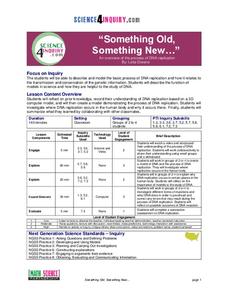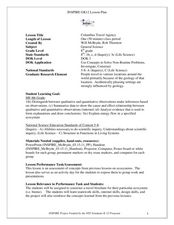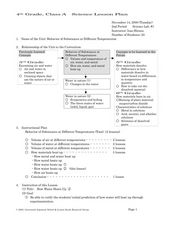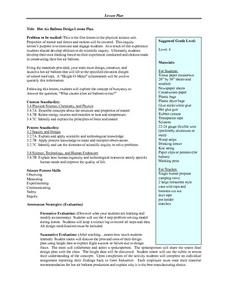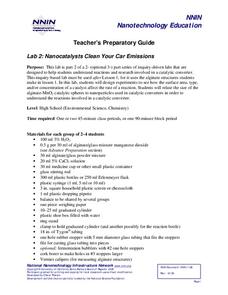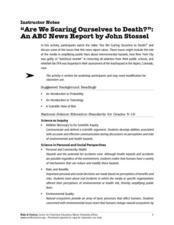Science 4 Inquiry
"Something Old, Something New..."
Young scientists learn about DNA replication through a video and model creation. They answer analysis questions before exploring the role of mutations and then complete a summative assessment.
Science 4 Inquiry
Maintaining Mass
Can you disprove the law of conservation of mass? Pupils observe the teacher weigh each part of a reaction. Then, the teacher weighs the result of the reaction and everyone sees that the products do not equal the reactants. Then they...
Science 4 Inquiry
Musical Vibes with Palm Pipes
Ancient people used musical pipes as early as the third millennium BCE. Young scientists explore the workings of musical pipes to better understand the relationship with frequency, length of pipe, and sound waves. They determine the...
Science 4 Inquiry
Layers and Laws: The Law of Superposition and Index Fossils
What can layers of rock teach us about the climate? Young scientists solve a mystery about who stole a cookie by applying the law of superposition. Then, they apply the same concept to solve a more difficult mystery, trying to determine...
Science 4 Inquiry
Genetics, Genetics, and More Genetics: Exploring Independent Assortment and Non-Mendelian Genetics
Two individuals share 99.9 percent of their genetic codes, yet diversity is observed everywhere. Young scientists learn about diversity through hands-on activities and an experiment. They apply the concepts of independent assortment and...
Curated OER
Columbus Travel Agency
Eighth graders research about their chosen ecosystem. In this life science lesson plan, 8th graders play the role of travel agents and create a travel brochure. They share this in class.
Curated OER
How Water Heats Up
Fourth graders conduct experiments heating water. In this inquiry-based early chemistry instructional activity, 4th graders use the materials given to experiment with the process of heating water. Students draw conclusions based upon...
Curated OER
Pulling It All Together
Students review data about a health problem and prepare an investigative report. Teams trade reports and utilize skills developed from previous lessons to evaluate the critical thinking evident in the reports.
Curated OER
Hot Air Balloon Design Lesson Plan
Sixth graders discuss what they know and what they want to know about hot air balloon using a KWL chart. They then use a wide array of materials to design a hot air balloon that will lift successfully in cooperative groups referring to...
Curated OER
Conducting a Scientific Investigation
Students investigate a possible health problem in the local school district through inquiry into attendance records, activities, maps, graphs, and data tables. The simulation continues as solutions for the problem are sought.
Curated OER
Science: Solids
Second graders investigate the properties of solids and discover how to classify them. Using rulers, they measure various solids on display. In groups, they play an identification game where one students names a location, such as the...
Curated OER
Science- Unit on Matter- Solids
Second graders identify and describe properties of matter.
They identify three forms of matter- solids, liquids, and gases with 100% accuracy. The student describes the properties of solid objects.
Curated OER
Honesty and Ethics in the Science Lab
Students complete a variety of lab and discussion activities as they are introduced to ethics and honest lab practices. They perform various biology, chemistry, or physics labs which test their ethical lab practices.
Curated OER
Chain Reaction
Students study animal behavior and how it changes to its environment. In this animal lesson students design and conduct experiments.
Out-of-School Time Resource Center
Nutrition and Physical Activity
Emerging nutritionists explore what it means to be healthy. In the beginning of the unit, your class will examine the five food groups and learn how food gets from the farm to our plates. This leads into the investigation of...
National Nanotechnology Infrastructure Network
Lab 2: Nanocatalysts Clean Your Car Emissions
Surface area certainly surfaces as a variable for chemical reaction rates. Scholars perform an experiment to discover how the size of catalysts affect the rate of a chemical reaction. They record their results in tables and graphs to...
Curated OER
MAISA and the REMC Association of Michigan
Students complete online research to study geography's impact on weather. In this geography and weather lesson, students research weather in their city for ten days using an online website. Students bookmark the site, enter data into a...
Curated OER
Investigate Pine Creek!
Young scholars are invited to become detectives in this Web-Integrated Science Environment (WISE) as they explore a local creek, its environment and ongoing status. Students participate in field trips, acquisition of data through water...
Curated OER
Are We Scaring Ourselves to Death?
Interesting! Have your high schoolers watch this 13-minute clip from the documentay, "Are We Scaring Ourselves to Death?" It examines the fear we have as a culture about death and whether or not the media increases those fears. The focus...
Curated OER
The Origin of Life: Alternative Views
Students explore the topics of faith and science as they relate to the origins of life. They consider the major points of Darwin's Theory of Evolution and brainstorm various explanations of how life began. Students investigate different...
Curated OER
Invertebrate Phyla
Learners explore the invertebrate phyla. They discuss the characteristics of the invertebrate Phyla in the Kingdom Animal. Students classify organisms into Phyla based on their characteristics. They distinguish radial symmetry, bilateral...
Curated OER
Pebbles, Sand and Silt -- Categorizing Fiction and Informational Books
Primary readers complete the activities in a Pebbles, Sand and Silt FOSS kit. As a class, they are given a group of rocks and they are to categorize them based on their activities in the FOSS kit. They use this information and apply it...
Curated OER
Sometimes, solid + liquid = gas
Third graders experiment with common household liquids and solids. In this chemical reaction lesson, 3rd graders discuss phase changes and experiment to find other ways to create gases. They use water, vinegar, lemon juice, flour, baking...
Curated OER
Will It Sink Or Float?
Have your class predict whether objects will sink or float in water. Learners consider a data table of mass, volume and whether the object sank or floated. They develop an evidence-based explanation for the results.
